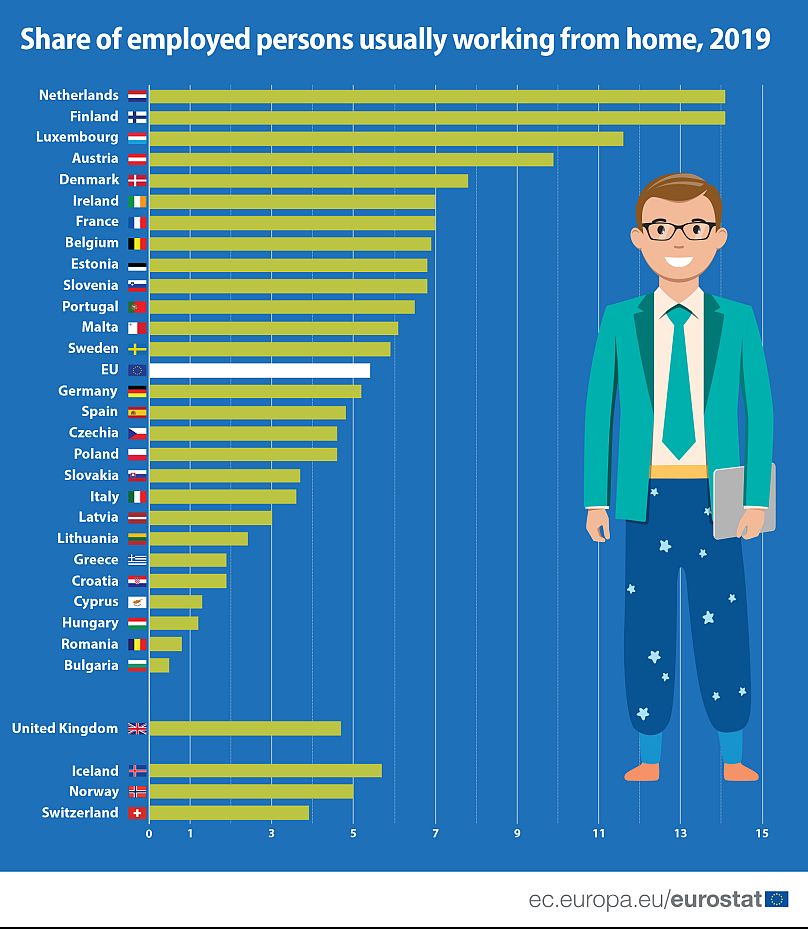Twitter is allowing its employees to work from home permanently. Should Europe shift to this model?
Twitter has told its employees they can work from home permanently — even after the COVID-19 pandemic.
Workers from the social media giant have been staying away from the company's San Francisco headquarters for weeks.
"Twitter was one of the first companies to go to a work-from-home model in the face of COVID-19, but we don’t anticipate being one of the first to return to offices," the firm said in a blog post, adding the last couple of months have proved remote working can be effective.
"So if our employees are in a role and situation that enables them to work from home and they want to continue to do so forever, we will make that happen.
"If not, our offices will be their warm and welcoming selves, with some additional precautions, when we feel it’s safe to return."
Many digital companies embraced stay-at-home policies from the start of the pandemic, saying most of their workers can do their jobs remotely.
In some tech companies, like Facebook and Google, employees currently working from home are allowed to continue to do their jobs remotely until the end of 2020.
Could office life become a thing of the past?
For experts, the question is one of a cultural shift and personal choices, more than one of possibility: the tools to work from home already exist, they say.
"If you do computer-based work, it is exactly the same if you work in an office or if you work from any coffee shop or from home," Silvina Moschini, the president of workforce management company Transparent Business, told Associated Press.
"COVID brought a massive acceleration, culturally-wise, much more than technology-wise, to help us change our minds and realise that we can do many things that before we did not know are even possible."
Remote work in Europe on 'upward trend'
In Europe, before the coronavirus pandemic, homeworking remained the exception, not the norm.
According to Eurostat, in 2019, 5.4 per cent of workers aged 15-64 in the EU usually worked from home.
"This share has remained constant at around 5 per cent throughout the last decade," Eurostat notes.
"However, over the same period, the share of those who sometimes worked from home has been rising: from 6.0% in 2009 to 9.0% in 2019."
The share of freelancers working from home has been on "an upwards trend" in the last decade according to Eurostat, which recorded a rise from 16.2 per cent in 2009 to 19.4 per cent in 2019.
That's compared to only 3.2 per cent of employees who said they usually worked from home in 2019 - although the figure has risen slightly from 2.7 per cent in 2009.
Remote work is a gender issue, too: Eurostat noted that in 2019, a slightly higher share of women reported that they usually worked from home than men: 5.7 per cent compared with 5.2 per cent.
Working from home might not mean the same thing to a man or a woman. During the COVID-19 pandemic, women have also faced more domestic work.
"Even without a crisis, caring responsibilities usually fall heavily on women," the European Institute for Gender Equality noted at the beginning of the crisis.
"Now with the closure of schools and workplaces, their unpaid workload is likely to further increase," it added.
Among European countries, the champions of remote work in 2019 were the Netherlands, with 14% per cent of the country's employees working from home, followed by Finland (14%), Luxembourg (11,5%), Austria (9,9%) and Denmark (7,8%).












